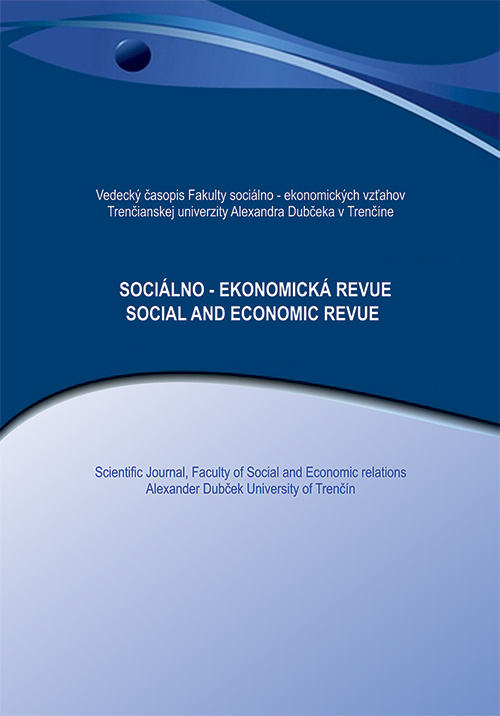TRENDS IN INCLUSIVE LABOUR MARKET DEVELOPMENTS IN THE VISEGRAD GROUP
Inclusive markets refer to a specific form of a social economy aimed at improving the capability of the long-term unemployed to get employed in the open labour market. The purpose of the paper is to identify trends shaping the V4 labour markets in terms of the inclusive market. In the paper, the Visegrad Group regional labour markets at NUTS II level are analysed and compared, using the indicators of employment rate 15-64, unemployment rate 20-64, and long-term unemployment rate in the monitored period of 2000 to 2016. In order to compare and evaluate the indicators, scoring and ranking methods are utilised. On average, the best scores are achieved by the regions in the Czech Republic, however some regions in Hungary also achieved excelled scores in the first and the last years under examination. In the period under analysis, the best ranking was achieved by the region of Prague, followed by two other regions in the Czech Republic, one region in Hungary and the region of Bratislava. The point assessment of all V4 regions shows that the top five regions also include the region of Bratislava, yet two regions out of four are holding the last positions.
Vydanie: 2018/1 Strany: 42-52 Klasifikácia JEL: J21, R11, R13
DOI:
Kľúčové slová: Inclusive market, labour market, employment, unemployment, long-term unemployment, regional policy, Visegrad countries
Sekcia: SOCIAL CONTEXT OF THE ECONOMY, LABOR MARKET AND HUMAN RESOURCES DEVELOPMENT
Kontakty:
Ing. Eva Koišová, PhD.
Alexander Dubček University of Trenčín
Faculty of Social and Economic Relations
Department of Economy and Economics
Telephone number: 00421327400425
e-mail: eva.koisova@tnuni.sk
Ing. Jana Masárová, PhD.
Alexander Dubček University of Trenčín
Faculty of Social and Economic Relations
Department of Economy and Economics
Telephone number: telephone number: 00421327400425
e-mail: jana.masarova@tnuni.sk
Mgr. Monika Gullerová PhD.
Alexander Dubček University of Trenčín
Faculty of Social and Economic Relations
Department of Social and Human Sciences
Telephone number: 00421327400484
e-mail: monika.gullerova@tnuni.sk
Literatúra:
Arumugam, M., Sulibhavi, I. (2017). Does MGNREGS Promote Inclusive Growth? What do Evidence Indicate? Asian Journal of Agriculture and Development, 14(1), 51-72.
Bialic-Davendra, M., Bednář,P., Danko, L., Matošková, J. (2016). Creative Clusters in Visegrad Countries: Factors Conditioning Cluster Establishment and Development. Bulletin of Geography. Socio-economic Series, 32 (2016), 33–47.
Delgadová, E., Gullerová, M., Ivanová, E. (2017). Recruitment and selection processes in Slovak enterprises and multinational corporations. International Journal of Organizational Leadership, 6 (2017), 211-220.
Di Cataldo, M., Rodríguez-Pose, A. (2016). What drives employment growth and social inclusion in EU regions. Discussion Paper Series, DP11551. London: Centre for Economic Policy Research.
Eurostat (2018). Database. Regional labour market statistics. [on-line] [cit.: 2018-03-02]. Retrieved from: http://ec.europa.eu/eurostat/data/database.
Furman, J. (2014). Global Lessons for Inclusive Growth. Dublin: The Institute of International and European Affairs.
Havierniková, K., Janský, B. (2014). The evolution of regional disparities in the Slovak Republic. Vadyba Journal of Management, 25(2), 133–138.
Lee, N., Sissons, P. (2016). Inclusive growth? The relationship between economic growth and poverty in British cities. Environment and Planning A: Economy and Space, 48(11), 2317-2339.
Liptáková, K. (2007). Ľudský potenciál ako jeden z faktorov regionálneho rozvoja. 2nd Central European Conference in Regional Science – CERS, 2007. pp. 609-613.
Lubyová, M., Štefánik, M. et al. (2015). Trh práce na Slovensku 2016+. Bratislava: Ekonomický ústav Slovenskej akadémie vied a Prognostický ústav SAV.
Michálek, A. (2014). Disparity v alokácii a čerpaní zdrojov s dôrazom na marginálne regióny Slovenska – GEOGRAFICKÝ ČASOPIS / GEOGRAPHICAL JOURNAL, 66 (2014) 3, 269-286.
OECD. (2014). All on board: Making inclusive growth happen. Paris: OECD.
Páleník, V., Páleník, M., Oravcová, I. (2013). Inkluzívne zamestnávanie. Bratislava: Inštitút zamestnanosti.
Páleník, V. a kol. (2015). Inkluzívny rast v stratégii Európa 2020 – naivita alebo genialita? Bratislava: Ekonomický ústav SAV.
Resolution Foundation (2012). Gaining from growth: The final report of the Comission on Living Standards. London: Resolution Foundation.
Smith, A., Jones, D., Scott, B., & Stadler, A. (2017). Designing and delivering inclusive and accessible entrepreneurship education. Jones, P., Mass, G., Pittaway, L., McElwee, G. (Eds.): New Perspectives on Entrepreneurship Education: New Perspectives on Research, Policy and Practice. (Contemporary Issues in Entrepreneurship Research; Vol. 7). Emerald.
Turok, I. (2010). Inclusive Growth: Meaningful goal or mirage. Pike et al. (eds): Handbook of Local and Regional Development. London: Routledge, 74-86.
Vojtovič, S., Krajňáková, E. (2014). Development of new economy and human capital. Vadyba Journal of Management, 25(2), 145–150.


